#Anti-unitarian
Text
Ok serious question time
So we’re thinking about possibly starting to go to church (unitarian Universalism) , most of us are down for it but one of my headmates is a vampire and she’s a bit concerned about it cuz, ya know vampires and churches don’t mix well
So my question is mostly for people who know a lot about Unitarian Universalism and for people who know a lot about vampires
Would it be safe/ok for a vampire (headmate) to enter a Unitarian Universalism church? /genq/srs
#osdd#endos dni#anti endo#traumagenic system#did#osddid#vampire#unitarian Universalism#vampires in church#tw religion#religion#tw vampire#I actually kinda need to know#even if you don’t know a lot I’d like to hear what you think#I’m listening to anyone who’s got something to say#of course I’m not taking hate though
14 notes
·
View notes
Text
worshipping God in your own way is the only way 🌹🐍🙏❤️✝️
#ask me anything#Heretic#Progressive Christian#Omnist#Omnistic#Hare Krishna#Religious Deconstruction#Religious Discourse#Pro Religion#anti religious corruption#Freedom of Religion#Wiccan#Buddhist#Unitarian#Quaker#Christian-Judeo
2 notes
·
View notes
Text
5 notes
·
View notes
Text
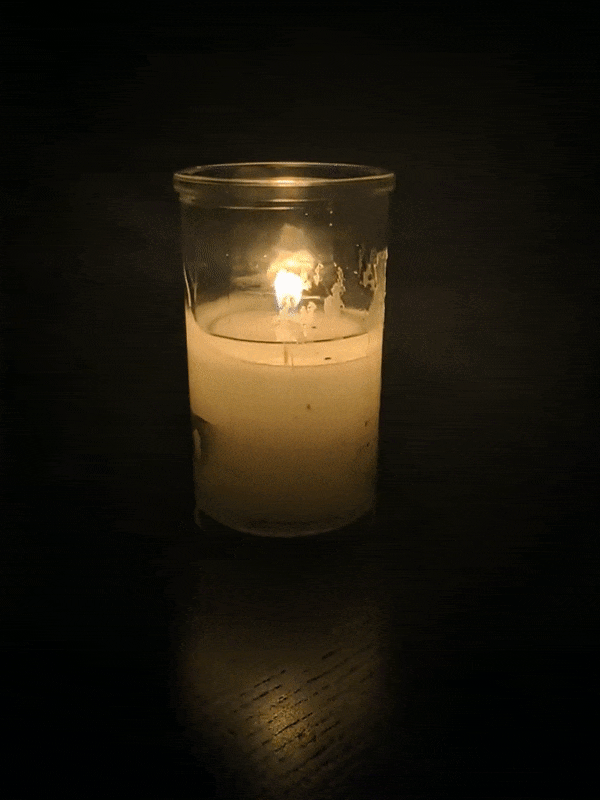
#it's been one year#raised Unitarian Universalist but the only thing I took away from it was a love of fire#am pretty anti-religious but the yahrzeit candle idea is a solid one#I miss my father
15 notes
·
View notes
Text
Christopher Mathias at HuffPost:
A coalition of 185 social justice and religious groups published an open letter Monday expressing support for the campus protest encampments sweeping the country in opposition to Israel’s siege of Gaza, and calling on university administrators to end the brutal crackdowns of the student-led demonstrations.
“We commend the students who are exercising their right to protest peacefully despite an overwhelming atmosphere of pressure, intimidation and retaliation, to raise awareness about Israel’s assault on Gaza — with U.S. weapons and funding,” the letter states. “These students have come forth with clear demands that their universities divest from corporations profiting from Israeli occupation, and demanding safe environments for Palestinians across their campuses. ”
Groups that signed the letter include Gen-Z for Change, Working Families Party, IfNotNow Movement, Young Democrats of America Black Caucus, Movement for Black Lives, Sunrise Movement, MPower Change, Jewish Voice for Peace, Palestine Legal, and the Unitarian Universalist Association.
Some 900 students have been arrested during anti-war encampments and demonstrations at American universities in the last 10 days, per a tally from Al Jazeera — a tumultuous period that mirrors volatile demonstrations against the Vietnam War in 1968, when police arrested at least 700 students.
The open letter Monday represents one of the largest shows of support among progressive groups for the burgeoning student protests, and makes clear the divide between establishment Democratic figures and social justice groups when it comes to U.S. support for Israel. President Joe Biden has refused so far to condition the sale of weapons to Israel.
“Our communities have been horrified to see the militarized and violent response to students protesting an ongoing genocide funded and supported by our government, and our coalition of organizations join millions of our members across the country in standing in solidarity with the students’ efforts in support of the people of Gaza,” Yasmine Taeb, one of the main organizers of the letter, told HuffPost. Taeb is a human rights lawyer and political director at MPower Change, a Muslim social justice group.
“Instead of attacking young people mobilizing for Palestinian human rights, President Biden needs to listen to the majority of Americans who have been calling on him to stop funding and supporting the atrocities committed against the people of Gaza,” Taeb said.
[...]
Israel has killed over 33,000 Palestinians since Oct. 7, when the Gaza-based militant group Hamas launched an attack in which nearly 1,200 Israelis were killed. In January, the International Court of Justice ruled that Israel’s siege of Gaza — which has displaced 85% of the population and put the occupied territory on the cusp of famine — left Palestinians at risk of experiencing a genocide. Last week, health officials in Gaza said medics had discovered mass graves at hospitals raided by Israeli troops.
“We join [the students] in calling for an immediate and lasting ceasefire and an end to the U.S. government’s and institutions’ role in the ongoing genocide of Palestinians in Gaza,” Monday’s letter states.
“As we stand in solidarity with the students protesting in encampments across the country, we reaffirm our commitment to amplifying their voices, condemn the university administration officials’ violent response to their activism, and demand that universities remove the presence of police and other militarized forces from their campuses,” it continues.
[...]
Meanwhile, Republican Party officials and right-wing media figures have accused the demonstrations of antisemitism, falsely equating criticism of Israel with bigotry towards Jews. Although there have been scattered reports of actual antisemitic incidents at or near the encampments, many were not perpetrated by students but by interlopers. Many of the student protesters across the country are Jewish.
Far-right agitators, including Christian nationalist activists, have also targeted the encampments, with MAGA pastor Sean Feucht leading hundreds of Christian and Jewish Zionists on a march around the Columbia campus on Thursday. The rally ended with pro-Israel demonstrators yelling through the gate at pro-Palestinian Columbia students. “Go back to Gaza!” they screamed.
More than 185 groups, including IfNotNow, Jewish Voice For Peace, MPower Change, and Working Families Party, signed a letter in support of the campus protests against Israel Apartheid State's genocide against Palestinians in Gaza.
#Gaza Genocide#Israel Apartheid#Israel/Hamas War#Ceasefire NOW Protests#Protests#Columbia University#Israel Apartheid State#Palestine#Gaza#IfNotNow#Jewish Voice For Peace#MPower Change#Working Families Party#Sunrise Movement#Gen Z For Change#Campus Protests
748 notes
·
View notes
Text
In solidarity with Calgary’s LGBTQ+ community, a local Unitarian church will celebrate Easter with a drag show in their Sunday service.
The “Drag Me to Church” service will coincide with Easter Sunday and the International Trans Day of Visibility, a day recognizing the contributions of trans people as the challenges they still face. The church service will also protest the introduction of legislation threatening the rights of transgender youth in the conservative governmental province of Alberta, Canada.
“No matter what tradition you’re from, I guarantee you that you will have people in your community who identify on the 2SLGBTQIA+ spectrum — whether they are free to say it or not,” the Rev. Samaya Oakley, the minister of the Calgary Unitarians, told the Edmonton Journal. “If we are truly people who believe in the goodness and the inherent love that exists in this world, then we would extend that to people on that spectrum.”
Continue Reading.
Tagging: @politicsofcanada @abpoli
337 notes
·
View notes
Text
i’ve realized recently how lucky i am that i was raised in a very open-minded, spiritual household.
while we went to church every week, no one told me about God or any sort of religious theology, because i was a child. i was sent to play in the nursery rather than listen and watch people cry on the stage about different religions and how they hope God or whoever they believe in gives them a break. i’m not describing it well, it was a while ago at our Unitarian Universalist church.
Mom and Dad only told me about how our family is pagan about a couple years ago, until then i hardly knew what religion i was supposed to follow, because Mom only talked about how i am the one who will change things for myself. i am the one who has to take action, even if i’ve blessed everything i own, i have to begin the changes myself, the rocks can’t do that for me.
anyways, about a year ago i told my mom about shifting, and it turns out she actually had already known about it. before that even, my therapist asked about it because another client was talking about it. i really wanted to ask who but, i knew she wouldn’t be able to tell me. i’ve even talked to my sister about shifting, she’s a bit weirded out by it, but she’s still open to the idea. i haven’t told Dad about it though, even though i tell him quite literally everything, i’m nervous to bring it up.
mom thinks about it as a sort of timeline type of thing, which is mildly confusing, but she still encourages me. it’s a bit awkward when she brings it up when the doctor talks about hallucinations, but she clarifies that it’s not a hallucination, and it seems like the psychiatrists believe us when we say it’s real.
when i see anti-shifters say that it’s just us being delusional, i’m reminded of how literally every medical professional that i’ve told about shifting, haven’t verbally questioned that it’s real.
i dunno where i was going with this. sorry guys, another ramble. i’m not good at long posts 😕 i’m gonna go to bed now, goodnight y’all 🤍
#shiftblr#shifting#reality shifting#teen fame dr#desired reality#fame dr#shifting motivation#shifters#reality shift#reality shifter#shifting consciousness#shifting realities#shifting script#shifting blog#shifting community#shifttok#shifting antis dni#shifting journey#shifting methods#shifting diary#house of shifting
75 notes
·
View notes
Note
i’ve been feeling compelled to plan a protest for Palestine in my small texas hometown. i haven’t made any posts about it yet, but i’m anxious about being the only one to show up. there have been protests in my town before in the same area and people had nasty reactions. do you have any advice for doing something like this solo?
You shouldn't do a thing like this solo. You should partner with local groups like Students for Justice in Palestine (check all your local college/university campuses), the US Palestinian Community Network, American Muslims for Palestine, various anti-racist and abolitionist groups within your community, other leftist organizing groups (but NOT the PSL or RCP), etc.
If your town is tiny tiny and not plugged into the existing infrastructure for these groups, you should still reach out to them and see how these orgs would prefer for engaged comrades to make a positive impact. They might have strong reasons to prefer that you invest your energy into another activity. Our energies should be coordinated and strategic here, and we should take our lead from the movement leaders who have been doing this work for decades and have the existing connections and know-how.
If these groups are supportive of the idea of you holding a protest but cannot offer the resources to support it, then you want to tap into local groups that might be able to generate a turnout: your local Mosques and Islamic community centers, Unitarian Universalist Churches, Society of Friends groups, pro-Palestinian Jewish groups, etc.
You want to make sure you are including the Palestinian liberation community directly in all things that you are doing here, and handing off the mic to them, if you are not Palestinian, or do not have extensive experience doing this work.
If there aren't large enough numbers of folks with close ties to this kind of activist work within your community, you can still make a big showing of solidarity with a small symbolic protest, but you want to exhaust all other options first, because it is far more useful for you to get organized alongside other people who have been doing this work than to launch an event yourself that potentially no one might go to. It might very well be the case that you have a lot more growing in your connections and activist experience that you need to do first and as your primary act of service to the cause at this time.
57 notes
·
View notes
Note
Hi! I was wondering, if you feel comfortable, if you could give an update as to how the wedding went and what your honeymoon was like? Only if you'd like to and it's not too private to share. It's more that I (and I'm sure others) were excited for you in the lead up to your wedding, and you mentioned it was a lovely day so would be keen to hear more :)
hi!! i would love to! it means a lot that people would be interested :)
overall, the wedding was amazing. the weather was perfect on the island. the ceremony garden overlooked the salish sea:

at the ceremony, we chose to do quiet vows so the crowd couldn't hear. at one point, i had put a silly pun in mine and it made A throw his head back and laugh, which made everyone laugh, and that was a really special moment. my niece read wild geese, which G had given me a copy of when i was at 3E so it was really sweet to have her there for that. A's dad officiated the ceremony (he's a unitarian minister) so that was really special. he did such an amazing job - i can't wait for the video!
the two of us went back to the room after the ceremony to just be with each other for a few minutes. we were both laughing and crying at the same time - it was an overflow of emotions!
after the ceremony, we had cocktail hour in the garden with oysters, apps, and special drinks based on our cats:
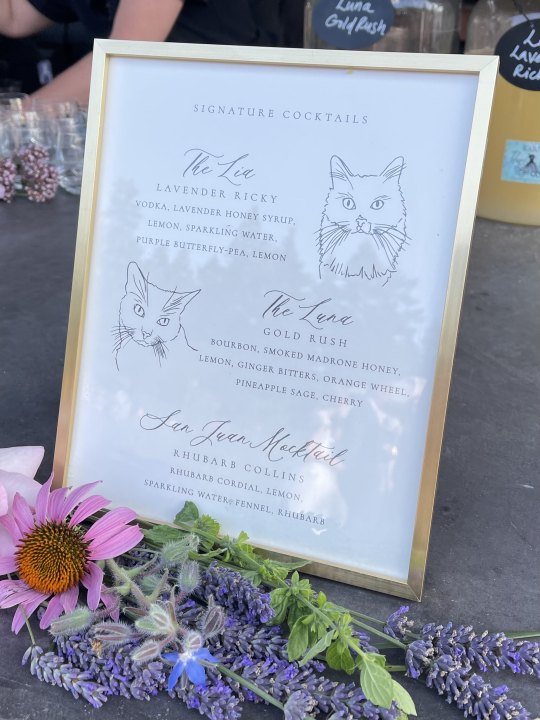
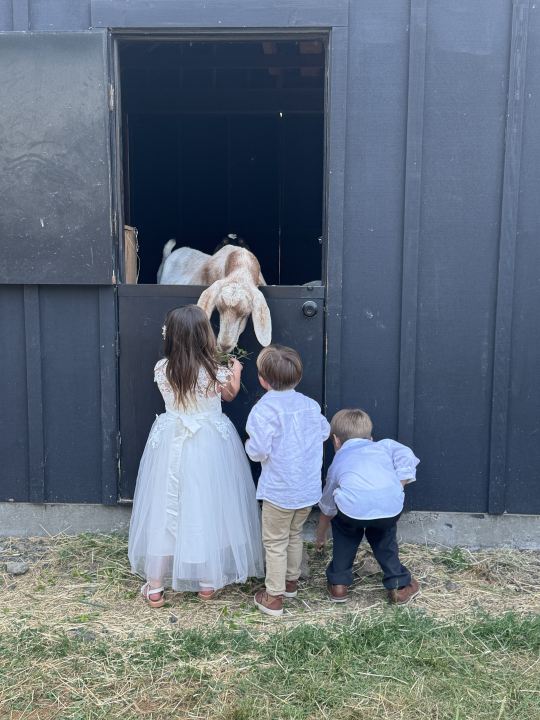
(the goats loved getting fed by the kids!)
then we headed over to the barn where we had our very cool seating chart, designed to look like a bookshelf with people's names and table numbers on the spine:

we ate dinner outside in the shadow of the barn:
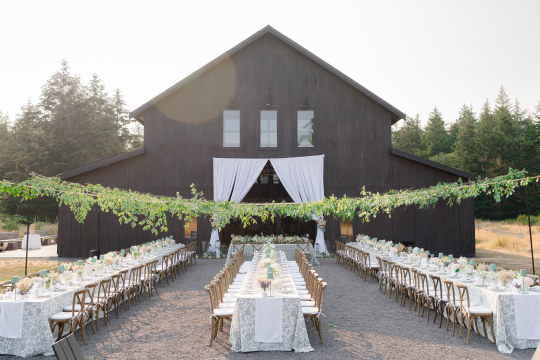
my best friend (the MOH) and A's brother (best man) gave hilarious toasts. then we went inside and had our first dance! i was sooooooo nervous (it was choreographed) but one of the sweet memories i'll have from the wedding is practicing in our bathroom the night before the wedding at like midnight. did not get much sleep that whole weekend!
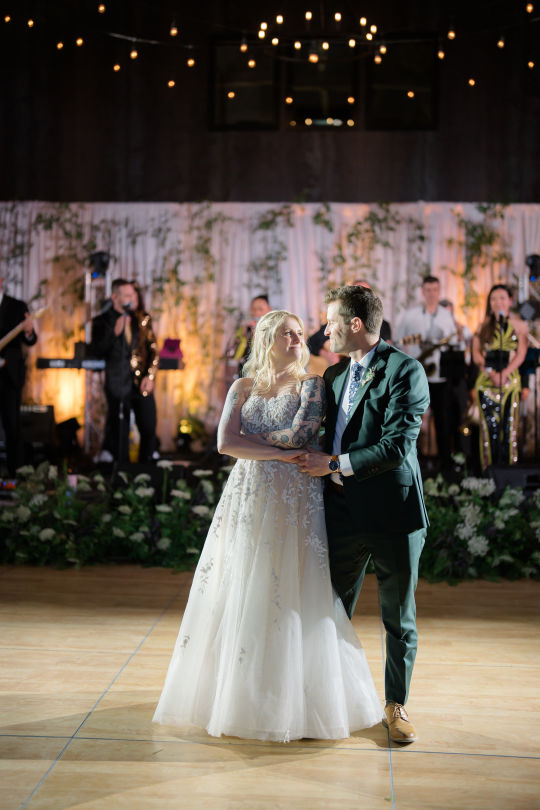
it was an amazingly special day, one that i will never forget.
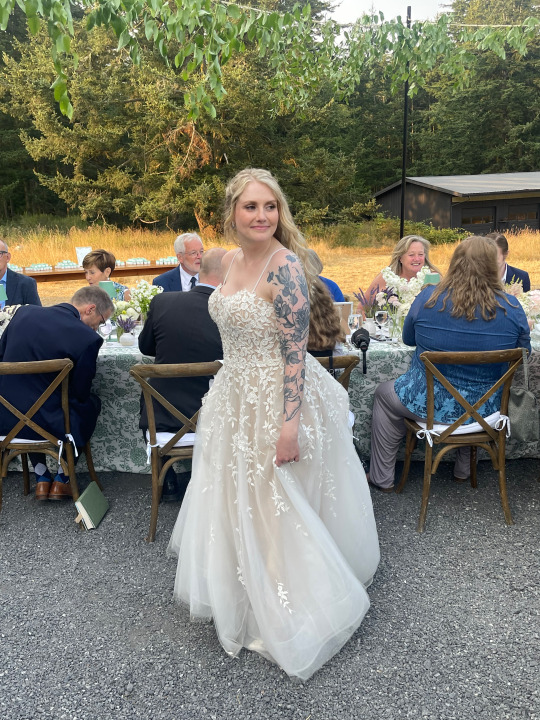

the honeymoon was also wonderful, but VERY hot. i do not do well in the heat lol so i was kind of crabby (also going through weed withdrawal which didn't help), but it cooled down a bit the second week so we did some more exploring.
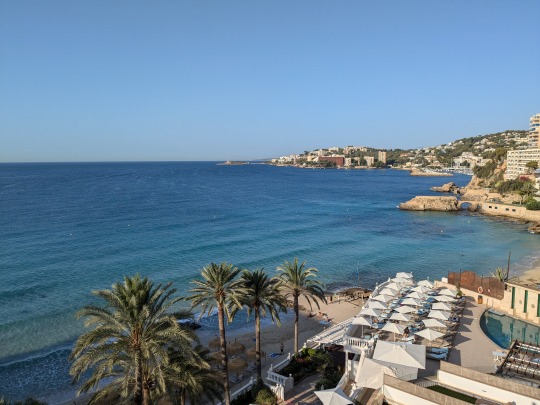
(this was our view from the hotel)
we visited an old castle, an art museum in palma, a hammam (arab baths), took a sailboat for a sunset cruise (i got sick off the back of the boat lol but it was a beautiful sight while i was retching hahahaha), and went out for dinner pretty much every night. there have been a lot of anti-tourism protests in mallorca (many people come on cruise ships and/or stay at all inclusive resorts so they're not really contributing to the local economy) so we did our best to spend money at smaller restaurants and stores. we went out for a nice dinner the final night. it was a fun trip but we were both very ready to get back home, see the girls, and enjoy as much ice water as we wanted!!!
27 notes
·
View notes
Text

Would you guess the “militant cringe lord atheists” are people objecting to a DSA meeting opening with a public prayer lead by a pastor? And not (as implied by this tweet) trying to force out religious groups people to make anti-religion a core platform or anything like that.
Like bruh how do these people not realize how profoundly conservative they sound? Like they are talking the same way as “keep Christ in Christmas” types with the only difference being this strange background assumption that religious working class people are all Unitarian Universalists
713 notes
·
View notes
Text
Revs. Jan Barnes and Krista Taves have logged hundreds of hours standing outside abortion clinics across Missouri and Illinois, going back to the mid-1980s. But unlike other clergy members around the country, they never pleaded with patients to turn back.
The sight of the two women in clerical collars holding up messages of love and support for people terminating a pregnancy “so infuriated the anti-abortion protesters that they would heap abuse on us and it drew the abuse away from the women,” recalled Taves, a minister at Eliot Unitarian Chapel in Kirkwood, Missouri, as she sat on a couch at Barnes’ stately church in this quiet suburb of St. Louis.
“I thought: ‘Whoa, these people really are not messing around.’ But then I thought, ‘Well, I’m not messing around either.’”
So when Missouri’s abortion ban took effect after the Supreme Court overturned Roe v. Wade last year, Barnes and Taves decided to fight back. Along with rabbis and ministers across several denominations, they joined a first-of-its-kind lawsuit arguing Missouri blurred the line between church and state, imposed a particular Christian idea of when life begins over the beliefs of other denominations, and threatened their ability to practice their religions.
As the nation nears the one year anniversary of the fall of Roe, the Missouri case is one of nearly a dozen challenges to abortion restrictions filed by clergy members and practitioners of everything from Judaism to Satanism that are now making their way through state and federal courts — a strategy that aims to restore access to the procedure and chip away at the assumption that all religious people oppose abortion.
In fact, many of the lawsuits are wielding religious protection laws enacted by anti-abortion state officials to target those officials’ own restrictions on the procedure.
In Indiana, a group of Jewish, Muslim and other religious plaintiffs sued over the state’s near-total abortion ban. Their argument: that it violates the Religious Freedom Restoration Act signed into law in 2015 by then-Gov. Mike Pence. A lower court judge sided with them in December and blocked the state’s ban from taking effect — the most significant win the religious challengers have notched so far.
Then, earlier this month, the Indiana judge granted the challengers class action status, meaning a win for them could apply to anyone in the state whose religion supports abortion access in cases prohibited by state law.
“Even if the Religious Freedom law was intended by Mike Pence to discriminate against people, we thought: ‘Let’s use this for good instead,’” said Amalia Shifriss, a leader of Hoosier Jews for Choice, one of the Indiana plaintiffs. “It brings me joy to think how much this must upset him.”
A Pence spokesperson characterized the lawsuit as a “pursuit to legalize abortion up to and even after birth.” They added: “It will probably strike Americans as pretty tasteless to call the latest iteration of their abortion crusade as a cause ‘for good’ and a source of ‘joy.’”
Conservatives with a history of mounting their own religious challenges to state laws dismiss the effort as doomed to fail, arguing that even if people can prove the abortion bans violate their beliefs, it won’t be enough to halt enforcement.
“As Justice Ruth Bader Ginsburg explained in one Free Exercise case, the right to swing your arm ends just where the other man’s nose begins,” said Denise Harle, senior counsel with Alliance Defending Freedom, a conservative legal group that has filed briefs defending state abortion restrictions, including from faith-based challenges in Wyoming and Florida. “Even if you have religious freedom, there is a line at which you are doing actual deadly harm and destroying human life, so it’s appropriate to limit what can be done in the name of religion.”
But with oral arguments and rulings in several of the cases expected this summer and fall, other legal experts say there’s a solid chance the challengers can persuade courts to grant religious exemptions to abortion bans if not strike them down altogether.
Shlomo C. Pill, a lecturer at the Emory University School of Law who specializes in religious rights, said the lawsuits have “a strong basis and should be successful,” particularly after a series of COVID-19-related cases paved the way for more religious exemptions. Pill pointed to multiple Supreme Court decisions during the pandemic that said whenever states create secular exemptions to laws — like indoor gathering restrictions or vaccine mandates — they have to justify not offering religious exemptions as well.
“So the fact that secularly-motivated exemptions to abortion bans exist — such as for rape and incest — means the legislature could also have to offer similar exemptions for people with religious objections,” he said.
‘REAL CHUTZPA’
Most of the cases, including those in Indiana, Kentucky, and Texas, are demanding exemptions from the bans for people whose religions support abortion rights. But a few, including the lawsuits in Florida, Missouri and Wyoming, are attempting to have the bans struck down entirely.
In Missouri, the plaintiffs argue that because lawmakers put religious language in the text of the abortion ban itself and made explicit religious appeals when voting on it, they violated the Establishment Clause.
“It took real chutzpah for the legislators to voice their own religious motivations, to wantonly and shamelessly purport to know what God wants or doesn’t want and to enshrine that into law,” said Rabbi James Bennett of Congregation Shaare Emeth in St. Louis, another plaintiff in the Missouri lawsuit. “They’re entitled to their interpretation of when life begins, but they’re not entitled to have the exclusive one.”
Last week, the group faced off in a St. Louis courtroom with state officials who are pushing to have the case thrown out. A ruling could come as soon as this summer.
In Florida, clergy representing Reform Judaism, Buddhism, the Episcopal Church, the United Church of Christ and the Unitarian Universalist Church sued in state court both to overturn the state’s 15-week abortion ban, and — if that fails — to secure religious exemptions. Their case makes free speech arguments as well — claiming that state bans on “aiding and abetting” abortions are muzzling clergy members who want to offer counseling to parishioners grappling with whether to terminate a pregnancy.
In Kentucky, three Jewish women are arguing that the state’s near-total abortion ban violates their belief that life only begins when a baby takes its first breath, saying it’s preventing them from pursuing pregnancy through in-vitro fertilization.
“To have someone else’s religious belief that an embryo is a human being imposed on me in a way that’s so personal, that prevents me from growing my family, is just rude and un-American,” Lisa Berlow, the lead plaintiff in that case, said in an interview. Berlow had one child through IVF and was planning to have another before Dobbs made her and her fellow plaintiffs fear prosecution. “Discarding non-viable embryos could now be criminalized, or I could miscarry and not know what type of medical care I would get or whether I would be investigated for causing the miscarriage,” she said.
The Satanic Temple is in federal court challenging abortion bans in Texas, Idaho and Indiana, arguing that the laws infringe upon their congregants’ belief in bodily autonomy and right to practice abortion as a religious ritual. A Texas District Court ruled against the Satanists last fall, saying they didn’t prove the need for a temporary restraining order blocking enforcement of the ban against its members. The 5th U.S. Circuit Court of Appeals is poised to rule on the challenge in the coming weeks.
These cases are unlikely to restore abortion rights at the federal level given the weaker religious rights protections in the U.S. Constitution compared to many state constitutions as well as the federal judiciary’s rightward tilt.
Elizabeth Reiner Platt, director of the Law, Rights, and Religion Project at Columbia Law School, stressed that the Supreme Court has a record of protecting the religious rights of some groups and not others, pointing to its back-to-back decisions in 2017 upholding the right of a Christian baker to refuse to bake a cake for a same-sex wedding and allowing the right of the Trump administration to deny entry to travelers from majority-Muslim countries.
“While I don’t like to read the tea leaves, I don’t have any hope that the current Supreme Court would, after ruling that there was no due process right or privacy right to abortion, would find a right under the Free Exercise Clause or the Establishment Clause,” Platt said.
Still, she and other legal experts see the state-level religious challenges as one of the best chances abortion-rights advocates have to chip away at bans on the procedure.
“The arguments are quite powerful for creating religious exemptions in the reproductive context under First Amendment doctrine and under state laws for Free Exercise,” said Micah Schwartzman, director of the Karsh Center for Law and Democracy at the University of Virginia Law School. “What Judges do with them is another story.”
In order to succeed, these lawsuits must prove: that the right to an abortion is central to the religious practices of the people suing; that they are sincere in their beliefs and have a track record of observing them; and that state abortion bans make it impossible for them to live according to their faith.
The cases challenging abortion restrictions in their entirety face an additional hurdle: proving that state officials stepped over the line separating church and state in crafting the bans.
“We have a really strong Establishment Clause argument because it’s clear that these bills were passed for religious reasons,” said Marci Hamilton, a professor of constitutional law at the University of Pennsylvania who is part of the legal team representing clergy in Florida. “The 15-week bill was signed in a church and members of the state legislature repeatedly referred to God when arguing why this had to be done.”
Other experts are skeptical, however, of the strength of these arguments.
“There are a million-and-one other explanations a state could give for their abortion restrictions,” Pill said. “They could argue it’s a matter of secular conscience, for example. And once you have any kind of secular justification, an Establishment Clause argument becomes more difficult.”
For their part, the states defending their abortion laws and the conservative legal groups supporting them have to prove that they have a compelling interest — unrelated to religion — in protecting fetal life, that they’re using the least restrictive means to protect that interest, and that the challengers’ claims are speculative and premature because none of them have actually sought an abortion or been blocked from obtaining one since the laws took effect.
“I think these are much more like political stunts than they are viable court cases,” said Lori Windham, a vice president and senior counsel at the Becket Fund, the legal firm behind the Hobby Lobby case that secured a Supreme Court ruling allowing many employers to opt out of covering certain forms of birth control for their workers due to a religious objection. “You can have a sincere political belief or policy preference, and it can be passionate and deeply held, but that doesn’t make it a religious practice.”
CITING SCRIPTURE
Judges have historically avoided questioning the sincerity of someone’s religious beliefs, but Becket and other groups have filed amicus briefs that do so.
To combat these accusations, the challengers point to scripture that lays out a case for abortion rights as well as support from religious leaders for their claims.
The Jewish challengers in Kentucky cite religious texts including the Mishnah that say life begins when a baby takes its first breath, not when it is conceived, and if medical issues arise during pregnancy, the pregnant person’s life “comes before the life of [the child].” They also submitted to the court letters from rabbis arguing that current state exemptions for life-threatening medical emergencies aren’t enough, saying Jewish law permits, and in some cases requires, an abortion when there is “a risk of poverty, abuse, addiction, or mental illness.”
The case challenging Missouri’s ban cites the United Church of Christ’s vote in 1971 to acknowledge the right to abortion and members’ “autonomy to determine what happens to their own bodies,” as well as the Episcopal Church’s “long-standing opposition” to any government attempt to infringe on reproductive choices.
“There’s a tendency to see these cases as kind of a clever, legal switcheroo. Like, here’s a way to take these laws that are often thought of as very conservative and use them to protect abortion rights,” Platt said. “But the idea of reproductive rights as a religious liberty issue is absolutely not something that came from lawyers. It’s how faith communities themselves have been talking about their approach to reproductive rights for literally decades.”
#us politics#news#politico#2023#abortions#abortion bans#reproductive rights#reproductive health#Missouri#Indiana#Religious Freedom Restoration Act#mike pence#Hoosier Jews for Choice#Alliance Defending Freedom#free exercise clause#religious exemptions#Kentucky#Texas#Florida#Wyoming#Establishment Clause#us constitution#in-vitro fertilization#Judaism#Episcopal Church#United Church of Christ#Unitarian Universalist Church#organized religion#religious freedom#the satanic temple
100 notes
·
View notes
Audio
Truly He taught us to love one another
His law is love and His gospel is peace
Chains he shall break, for the slave is our brother
And in his name all oppression shall cease
Sweet hymns of joy in grateful chorus raise we
With all our hearts we praise His holy name
Christ is the Lord! Then ever, ever praise we
His power and glory ever more proclaim!
“Since that first rendition at a small Christmas mass in 1847, "O Holy Night" has been sung millions of times in churches in every corner of the world. And since the moment a handful of people first heard it played over the radio, the carol has gone on to become one of the entertainment industry's most recorded and played spiritual songs. This incredible work--requested by a forgotten parish priest, written by a poet who would later split from the church, given soaring music by a Jewish composer, and brought to Americans to serve as much as a tool to spotlight the sinful nature of slavery as tell the story of the birth of a Savior--has become one of the most beautiful, inspired pieces of music ever created.” (x)
Learn about the abolitionist history of O Holy Night:
“Things start in 1843 or 1847—there’s some discrepancy about the year—in Roquemaure, a small town in the Rhône valley region. Placide Cappeau, who had followed his father into the wine business, was also known for the poetry he composed. Though a critic of the Catholic church, Cappeau was asked by the local priest to write a few stanzas in celebration of the town cathedral’s newly refurbished organ. He is said to have written the song’s words while in transit to Paris on business, with the biblical Gospel of Luke as inspiration. On the advice of the same clergyman who had commissioned him, Cappeau took his completed work—then titled “Minuit, Chrétiens,” or “Midnight, Christians”—to Adolphe Adams, a composer of some renown. Adams, who was of French-Jewish descent, arranged the music, and the song was newly christened as "Cantique de Noel.” The carol would make its world debut, with opera singer Emily Laurey belting lyrics, during Christmas eve midnight mass at the Roquemaure church...
Though "Cantique de Noel” would quickly become a French Christmas favorite, it was later denounced by the French Catholic church—a reported consequence of Cappeau being an avowed atheist and socialist, along with the discovery that Adams was Jewish, not Christian. One bishop reportedly dismissed the song as having a "lack of musical taste and total absence of the spirit of religion.” There was also some resistance to Cappeau’s overtly anti-slavery lyrics in the third verse, which were perhaps made more glaring by his emergent political outspokenness. In any case, the ban reveals where the French Catholic church stood on matters of abolition...
In any case, "Cantique de Noel” would make its way across the Atlantic to John Sullivan Dwight, a white American abolitionist, Unitarian minister, musician and classical music aficionado who published a magazine called Dwight's Journal of Music...
Dwight gave his translated verse the title “O Holy Night” when he published it in his music periodical in 1855. It apparently became a hit in the U.S., gaining popularity among the abolitionist crowd during the Civil War. Even as the song was being banned in its home country, it was becoming a staple of Christmas, and a song of protest, thousands of miles away, in the U.S. It’s long since become part of the broader American Christmas songbook.”
(x)
353 notes
·
View notes
Text
gonna start using increasingly obscure Protestant factions when talking about fandom discourse or whatever.
I wish these butthurt sociniateens would shut up about my yaoi
christadelphian anti kink losers
people who won't vote for biden are just Unitarian universalist doomers (not that obscure obviously but the idea of a UU doomer is way too funny)
this modern muggletonian (this one is great because it sounds like harry potter shit) obsession with ai art
etc etc, you can do better than the anglican church lol (although I'm convinced people here mostly mean the yankee puritan migrants because this website is seppo land)
14 notes
·
View notes
Text
I’ve been angry at Israel for years. Please don’t misunderstand me. My dad was Jewish, my mom a heathen. That means according to traditional matrilineal Judaism, I’m not Jewish, but according to Hitler and his ilk, I totally am.
I’m not a good Jew. I’ve never kept Kosher or attended temple regularly. Half the time for Hanukkah I forget to light my damn Menorah. I host my family’s Seder at Passover every spring because I didn’t want my kids to grow up entirely ignorant of their family’s culture and traditions. But it’s not a traditional Haggadah that I use, because I’m a bleeding heart liberal who wants as much inclusion as I can possibly shoehorn into the framework my grandparents left me.
I taught my kids the Hebrew blessing that I learned at the Unitarian church for lighting the candles. I took a semester of Biblical Hebrew in college so I could at least have a better picture of my own ignorance.
All this is to say, while no good Jew would count me in their number, I still, to a limited extent, count myself there. Their suffering would have been mine, but for a slight shift in time and place.
But just as I would be included in Jewish victimhood, so I share in culpability for our mistakes.
The history in Israel-Palestine is long and bloody and more complex than I understand. I am not in a position to judge anybody. But here is what I know:
1. We need Israel, because “Never Again” is an ideal we must never cease working towards. Anti-Semitism is real, and it is a force for evil in this world.
2. “Never Again” must include Everyone. Jews. Muslims. Christians. Faiths from all around the world. Agnostics and Atheists too. Heathens and True Believers. We all have a right to protect ourselves, but we don’t have the right to turn others who are ‘not like us’ into victims.
I see strong pro-Palestinian sentiment here, and I support it. People must not be oppressed, must not be systemically murdered or disenfranchised. But where that strong pro-Palestinian feeling bleeds into anti-Semitism, you lose me.
It is possible to uphold the rights and personhood of disparate people at the same time. It is possible to live in peace with each other. It is possible, and necessary, to love one another, not just in spite of our differences, but because of them.
This we must do if we want a hope of surviving the years to come.
#palastine#israel#israel palestine conflict#conflict resolution#love trumps hate#please we need to listen#god give me a listening heart#religion#agnosticism#atheism#stop the violence#stop the genocide#stop the oppression#standing on the side of love
11 notes
·
View notes
Text
Lieutenant Commander Fara - An ordained Neo-Universalist pastor, known to the USS Sorcerer's crew as "Padre", Fara is a member of the Benfa species, a former prey species on their homeworld.
The Benfa adapted to survive against their predators (now known as the Cajak species, also a Federation member) by evolving telepathic hypnotic headstalls, and the ability to produce Cajak pheromones as well as their own. This eventually led to hybrid Benfa-Cajak herds, and hybrid offspring- eventually called Benjaks- combining the four arms, muscles, strength, speed and horns of the Cajak, with the hypnotic headstalks and toughness of the Benfa. When they developed sapience, it was these mixed social groups that were the most successful at survival- the Cajak would do the hunting and fighting, the Benfa would defend the young and build shelters. Over the next 30,000 years, the two species ceased being predator-prey and became mutually beneficial partners. The first spaceflight from their world was symbolically commanded by a Benjak, flown by a Cajak, and the engineer was a Benfa.
However, over those 30,000 years, many times the Benjaks were used as scapegoats for various problems by leaders and movements across the planet- leading to social stigma against against Benjaks, laws against their conception, and outright violence against and mass murder of the hybrids. Luckily, the planetary government that emerged from the fourth major planet wide war around 400 years ago ended all such violence (a social stigma remains among some groups descended from the various anti-Benjak groups, but isn't acted upon- at least not without severe consequences afterwards) and Benjaks are now a small but sizeable portion of the planetary population ever since.
LCDR Fara is a member of the Neo-Universalist religion, which grew out of combination of the Unitarian Universalist movement, as well as a human fusion religion on the ancient colony world of Terralysium. The Neo-Universalist faith encompasses a wide search of beliefs from hundreds of different religions, encouraging members to study many religions, and find a personal pantheon and theologic beliefs that most speaks to them as an individual.
LCDR Fara uses his extensive experience with his own faith, and his studies of dozens of alien religions, to serve as an extremely effective and unifying force among the crew of the USS Sorcerer.
10 notes
·
View notes
Text
Pinned Post
This is a focused blog dedicated to raising awareness of, hosting discussions about, and supporting those affected by compulsory sexuality and sexual pressure within alternative spiritual communities, especially those that fall under the umbrella of witchcraft and paganism. We write from an aromantic asexual perspective, but all perspectives are welcome here, as compulsory sexuality harms people of all identities and orientations.
This blog is not anti-pagan. We are writing as members of a community which we love deeply, but which has wronged us and others in the name of sexual liberation. It is not anti-sex, either-- we believe that the right to refuse is an important and vital part of sexual freedom, and that fostering consent culture entails ensuring that all people feel safe and comfortable saying no to acts that infringe upon their boundaries.

Mod Lyta (ey/em): 26 years old, aroace and agender, eclectic pagan Unitarian-ish creature currently exploring Norse Polytheism, have been in and around various occulty spaces both online and offline since I was a teenager. When I'm not writing here I enjoy sci-fi, RPGs of both the video and tabletop variety, and getting bossed around by my two cats.
Mod Astra (she/they): 23 years old, aroace, practicing ancestral witchcraft and paganism. I��m very solitary, I do not have a lot of experience in wider communal pagan spaces, I mostly like reading and writing as I’m too disabled for most physically exhaustive activities. I like to keep to myself and maintain privacy and anonymity online, so you probably won’t learn too terribly much about me personally.
4 notes
·
View notes